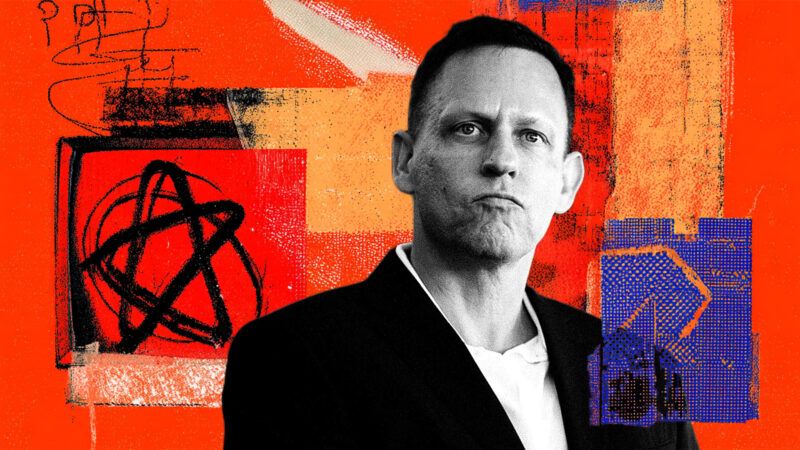I Listened to Over 7 Hours of Peter Thiel's Leaked Antichrist Lectures. They're Surprisingly Libertarian.
The PayPal and Palantir co-founder warns about the dangers of government overreach and a one-world state.

Who is the Antichrist, the biblical antagonist whose rise marks the beginning of the end-times? Peter Thiel recently took a stab at answering this age-old question.
The billionaire and co-founder of PayPal and surveillance company Palantir recently delivered a series of four lectures on behalf of ACTS 17 Collective—a nonprofit dedicated to Acknowledging Christ in Technology and Society (ACTS)—about the Antichrist. Reason acquired recordings of the lectures, which ran the gamut from theology and history to science and economics. While Thiel does not explicitly identify who the Antichrist is, he outlines an Antichrist-like system he fears will arise this century.
Thiel kicks off the lecture series by identifying himself as two things in his private life: "A small-o orthodox Christian" and a "humble classical liberal." Thiel claims his fears about the Antichrist are his only "deviation from classical liberal orthodoxy," and his analogy between the Antichrist and one-worldism, one of the central motifs of his lectures, is unmistakably libertarian.
While the rapid rise in AI and other advanced technologies has led many to believe that the Antichrist will use technology to accomplish his goals—the New York Times opinion columnist Ross Douthat has even suggested to Thiel that the surveillance technology provided by Palantir could be a tool for the Antichrist—Thiel says in his first lecture that, "in the 21st century, the Antichrist is a Luddite who wants to stop all science." In his second lecture, Thiel goes on to identify "the legionnaires of the Antichrist [as people] like Eliezer Yudkowsky, Nick Bostrom, and Greta Thunberg [who] argue for world government to stop science."
Although Thiel doesn't explicitly reference Crisis and Leviathan (1987)—the celebrated book by American historian and economist Robert Higgs—he warns that the former precipitates the latter. In his first lecture, Thiel cites Matthew 24:6 to insist that "the Antichrist will come to power by talking about Armageddon non-stop" and 1 Thessalonians 5:3 as evidence that the Antichrist will rise to power by promising "peace and safety." In his second lecture, Thiel explains how "a new, reformed government called 'Leviathan,'" as described by political philosopher Thomas Hobbes in his 1651 political treatise, that wields supreme power to cow men into peaceful cooperation, will be ridden by the Antichrist "to take over the world."
Opposition to totalitarianism aside, not all of Thiel's comments fit comfortably within the libertarian worldview. Thiel criticizes "zombie liberalism" and "lame libertarian abstractions," preferring an anti-communist ideology where "you could do some pretty bad stuff because the communists were so much worse." For example, Thiel praises the CIA of the '60s, '70s, and '80s, for being "sort of this rogue thing outside the State Department," which he says was full of communists.
Still, Thiel recognizes state power as a double-edged sword, identifying the American empire as simultaneously "the natural candidate for Katechon"—the entity that delays the emergence of the Antichrist—"and Antichrist; ground zero of the one-world state, ground zero of the resistance to the one-world state." In his third lecture, Thiel names "tax treaties, financial surveillance, and sanctions architecture" as defining features of the international "Antichrist-like system" of international governance. Thiel explains how "it's become quite difficult to hide one's money" in the wake of the Patriot Act, the "extensive" administrative state (the Treasury Department, in particular), and the centralization of payments on the Society for Worldwide Interbank Financial Telecommunications system—an international messaging network better known as SWIFT, which banks use to process global payments. All of these factors make it impossible to "escape from global taxation if you're a U.S. citizen," he says. Thiel links this erosion of financial freedom to Revelation 13:16-17, which prophesies about a society where an individual's ability to engage in commerce is contingent upon brandishing the mark of the beast on one's body.
Thiel also identifies a "caesaropapist one-world state" as another possible Antichrist-like system. A watered down version of caesaropapism that has been embraced by the political right in recent years is Catholic integralism, which advocates for the state to enforce "duties of community and solidarity in the use and distribution of resources," according to Adrian Vermeule, a Harvard Law School professor whom Thiel says "dream[s] about a unified caesaropapist empire that never was in the Middle Ages." Thiel's opposition to this illiberal political philosophy is evidenced by his concern about Vice President J.D. Vance being "too close to the Pope." Regarding reports of conflicts between Vance and the Pope, Thiel says he hopes "there are a lot more because it's the caesaropapist fusion that I always worry about."
Yet, for all of his hand wringing that the Antichrist will come to power this century and bring about total destruction, Thiel refuses to prescribe a "systematic formula" to fight this figure, which might be the most libertarian aspect of his lectures. Instead, he encourages the audience "to think for [themselves] for a little bit." Thiel returns to the importance of free will in his final lecture, saying that there "are choices we have to make" to resist the rise of the Antichrist and that "it's for people here to make choices; to decide."


Show Comments (28)